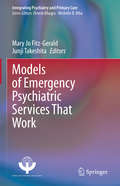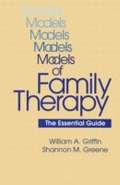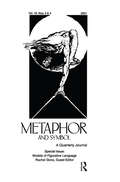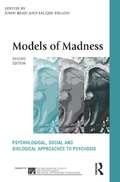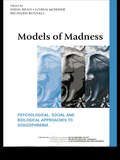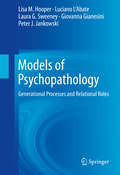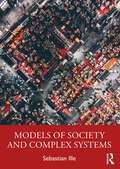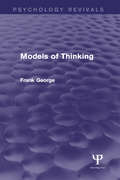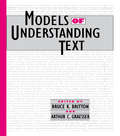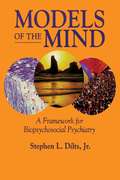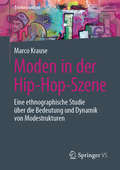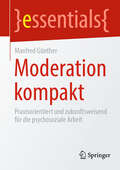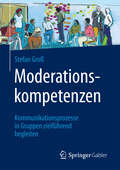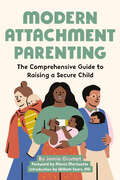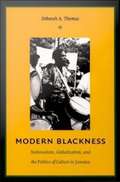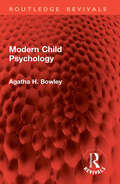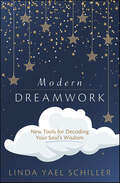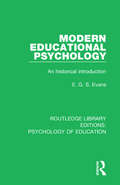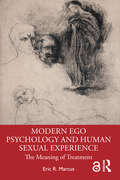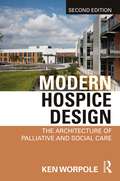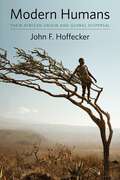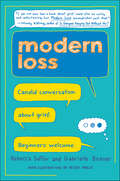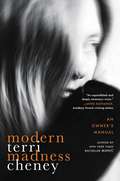- Table View
- List View
Models of Emergency Psychiatric Services That Work (Integrating Psychiatry and Primary Care)
by Mary Jo Fitz-Gerald Junji TakeshitaThis book describes a spectrum of possible solutions to providing comprehensive emergency psychiatric care. It discusses in detail all components of emergency psychiatric care, such as triage, security, management of suicide risk, violent patients, interdisciplinary treatment teams, administration, and telepsychiatry. It has been written by and is of interest to psychiatrists, emergency medicine physicians, nurses, social workers, administrators, the police and security staff.
Models of Family Therapy: The Essential Guide
by Williams A. Griffin Shannon M. GreeneModels of Family Therapy provides an overview of established family therapy models. All classification schemes of family therapy models must reduce ideological complexity, ignore overlap, and generalize for the purposes of category inclusion and exclusion. Nonetheless, orientation differences do exist and the authors make these differences clear by placing ideas and methods into categories. To facilitate learning how the dimensions of each model "fit" with other models, this book enhances comparability by using the same general outline in all chapters. In these outlines, the critical components of each model are broken down into a few core assumptions, terms, techniques, and methods. These critical components are summarized consistent with their description in the original publications. Some of these models include structural, strategic, behavioral, psychoeducational, and experiential therapy. Because of the style of presentation, this book can be useful as a primary text or supplement in a marriage and family therapy course. In addition, graduate students and professionals can benefit from this guidebook in order to prepare for any state or national examination on marriage and family therapy.
Models of Figurative Language: A Special Double Issue of Metaphor and Symbol
by Taylor Francis GroupFirst published in 2001. Volume 16, Numbers 3&4. This special issue is an attempt to record the state of the art of psycholinguistics research into figurative language. There are quite a number of models addressing distinct issues and aiming to solve different problems—the mark of a maturing field. Indeed, not one theory is tailored to solve all the problems. Rather, each model, while aiming at generality, also recognizes its limitation. Despite specializing in different topics, most of the theories presented here have some things in common. For one, most of them dispense with the literal/ nonliteral divide, proposing, instead, models that are capable of handling literal as well as figurative language. Some models focus on the role primary meanings play in comprehension, others shed light on context effects, and some models seem to encompass both in terms of the accumulating effects of constraints (whether linguistic or contextual).
Models of Madness: Psychological, Social and Biological Approaches to Psychosis (The International Society for Psychological and Social Approaches to Psychosis Book Series)
by John Read Jacqui DillonAre hallucinations and delusions really symptoms of an illness called ‘schizophrenia’? Are mental health problems really caused by chemical imbalances and genetic predispositions? Are psychiatric drugs as effective and safe as the drug companies claim? Is madness preventable? This second edition of Models of Madness challenges those who hold to simplistic, pessimistic and often damaging theories and treatments of madness. In particular it challenges beliefs that madness can be explained without reference to social causes and challenges the excessive preoccupation with chemical imbalances and genetic predispositions as causes of human misery, including the conditions that are given the name 'schizophrenia'. This edition updates the now extensive body of research showing that hallucinations, delusions etc. are best understood as reactions to adverse life events and that psychological and social approaches to helping are more effective and far safer than psychiatric drugs and electroshock treatment. A new final chapter discusses why such a damaging ideology has come to dominate mental health and, most importantly, how to change that. Models of Madness is divided into three sections: Section One provides a history of madness, including examples of violence against the ‘mentally ill’, before critiquing the theories and treatments of contemporary biological psychiatry and documenting the corrupting influence of drug companies. Section Two summarises the research showing that hallucinations, delusions etc. are primarily caused by adverse life events (eg. parental loss, bullying, abuse and neglect in childhood, poverty, etc) and can be understood using psychological models ranging from cognitive to psychodynamic. Section Three presents the evidence for a range of effective psychological and social approaches to treatment, from cognitive and family therapy to primary prevention. This book brings together thirty-seven contributors from ten countries and a wide range of scientific disciplines. It provides an evidence-based, optimistic antidote to the pessimism of biological psychiatry. Models of Madness will be essential reading for all involved in mental health, including service users, family members, service managers, policy makers, nurses, clinical psychologists, psychiatrists, psychotherapists, counsellors, psychoanalysts, social workers, occupational therapists, art therapists.
Models of Madness: Psychological, social and biological approaches to schizophrenia
by John Read Loren R. Mosher Richard P. BentallIs schizophrenia an illness? Is madness preventable? This controversial, but carefully researched, book argues that what psychiatrists call "schizophrenia" is not an illness.
Models of Psychopathology
by Luciano L'Abate Lisa M. Hooper Laura G. Sweeney Giovanna Gianesini Peter J. JankowskiThis book explores current relational models of psychopathology that undergird a great many conflicts and destructive outcomes in family and intimate relationships. These models have similar features and can be considered as a group. They are all: (1) generational; (2) relational; and (3) fundamentally reactive processes stemming from existing psychopathology.
Models of Society and Complex Systems
by Sebastian IlleModels of Society and Complex Systems introduces readers to a variety of different mathematical tools used for modelling human behaviour and interactions, and the complex social dynamics that drive institutions, conflict, and coordination. What laws govern human affairs? How can we make sense of the complexity of societies and how do individual actions, characteristics, and beliefs interact? Social systems follow regularities which allow us to answer these questions using different mathematical approaches. This book emphasises both theory and application. It systematically introduces mathematical approaches, such as evolutionary and spatial game theory, social network analysis, agent-based modelling, and chaos theory. It provides readers with the necessary theoretical background of each toolset as well as the underlying intuition, while each chapter includes exercises and applications to real-world phenomena. By looking behind the surface of various social occurrences, the reader uncovers the reasons why social systems exhibit both cultural universals and at the same time a diversity of practices and norms to a degree that even surpasses biological variety, or why some riots turn into revolutions while others do not even make it into the news. This book is written for any scholar in the social sciences interested in studying and understanding human behaviour, social dynamics, and the complex systems of society. It does not expect readers to have a particular background apart from some elementary knowledge and affinity for mathematics.
Models of Thinking (Psychology Revivals #Vol. 1)
by Frank H. GeorgeIn this volume, originally published in 1970, an attempt is made to examine the more logical aspects of thinking, such as the ability to abstract and the manner in which concepts develop. The author describes the features that had long been regarded as central to thinking by experimental and theoretical psychologists of the time and he places more emphasis on the part played by language in cognitive activity. In the second part the author points out how such basic features of thinking as concept and hypothesis formation, inference making and the use of ordinary English are essentially things that can be carried out by a computer. His use of theories and his methods of modelling the human brain and the way it works comprise an intriguing and highly sophisticated attempt to provide an appropriate framework in which problems of thinking can be studied. Professor George was the author of several books, the best known of which at the time were The Brain as a Computer and Cybernetics and Biology. His writings covered many aspects of psychology, philosophy and logic, as well as cybernetics. At the time of original publication he was Professor of Cybernetics at Brunel University and Chairman of the Bureau of Information Science.
Models of Understanding Text (Cog Studies Grp of the Inst for Behavioral Research at UGA)
by Arthur C. Graesser Bruce K. BrittonWhat is text understanding? It is the dynamic process of constructing coherent representations and inferences at multiple levels of text and context, within the bottleneck of a limited-capacity working memory. The field of text and discourse has advanced to the point where researchers have developed sophisticated models of comprehension, and identified the particular assumptions that underlie comprehension mechanisms in precise analytical or mathematical detail. The models offer a priori predictions about thought and behavior, not merely ad hoc descriptions of data. Indeed, the field has evolved to a mature science. The contributors to this volume collectively cover the major models of comprehension in the field of text and discourse. Other books are either narrow -- covering only a single theoretical framework -- or do not focus on systematic modeling efforts. In addition, this book focuses on deep levels of understanding rather than language codes, syntax, and other shallower levels of text analysis. As such, it provides readers with up-to-date information on current psychological models specified in quantitative or analytical detail.
Models of the Mind: A Framework for Biopsychosocial Psychiatry
by Stephen L. DiltsMaking sense of such bewildering problems as hallucinations, paranoia, depression, and anxiety seems an incredible challenge, but modern psychiatry is able to bring understanding and change to many of those whose lives are impaired by psychiatric problems. This is not accomplished through the application of one dominant psychological theory, but through the integration of perspectives of many such theories in this diverse field into a befitting approach-the biopsychosocial model.Application of the biopsychosocial model will allow for understanding the patient in biological, psychological, and social terms simultaneously, and provide a holistic picture with multiple strategies for treatment.In this book, the author takes a step back from the assessment to demonstrate to the student methods of the information gathered from the patient into a clinically useful whole, essentially showing exactly how and why the psychiatrist arrives at an intervention.
Moden in der Hip-Hop-Szene: Eine ethnographische Studie über die Bedeutung und Dynamik von Modestrukturen (Erlebniswelten)
by Marco KrauseDiese Arbeit widmet sich dem Thema der szenespezifischen Moden. Der Kern dieser Forschungsarbeit besteht daraus, anhand einer ethnographischen Studie das szenespezifische Modephänomen im Kontext der Hip-Hop-Szene in seinen Strukturen abzubilden und dessen Facetten, Bedeutungen und Differenzierungen aufzudecken, um daran anknüpfend aufzuzeigen, welche Produkte beziehungsweise Produkteigenschaften die Szene-Mitglieder als Mode deklarieren und konsumieren und welchen Stellenwert dieses Phänomen innerhalb der Szene einnimmt. Die übergreifende Zielstellung bildet dabei die Generierung eines differenzierteren Betrachtungsansatzes des Modephänomens, welcher auf die Vergemeinschaftungsform der Hip-Hop-Szene bezogen ist und deren innere Strukturen und Facetten berücksichtigt.Der InhaltForschungsstand: Moden und Szenen • Forschungsstand: Hip-Hop-Szene • Forschungsdesign • Konsumrelevante Werte, Strukturen und Relationen in der Hip-Hop-Szene • Produktkonsum in der Hip-Hop-Szene • Moden in der Hip-Hop-SzeneDer AutorMarco Krause ist Soziologe mit Fokus auf den Bereich Konsumsoziologie und Consultant im Bereich Digital Intelligence.
Moderation kompakt: Praxisorientiert und zukunftsweisend für die psychosoziale Arbeit (essentials)
by Manfred GüntherDer Text zeigt eine Vielfalt praxiserprobter Techniken und Formen der Gesprächsführung. Der Autor zeigt konkret und beispielhaft, wie verantwortliche Fachkräfte gut strukturierte Sitzungen erfolgreich gestalten können. Dienstvorgesetzte ohne Teamleitungserfahrung werden mit operationalisierten Verfahren kritisch angeleitet, ihren Job besser umzusetzen. Eingeführt werden auch sehr neue KI-fundierte Web-Instrumente wie Virtual Reality (Avatar)-Teams.
Moderationskompetenzen
by Stefan GroßDieses Buch vermittelt kompakt und fundiert Moderationskompetenz für alle, die Besprechungen, Meetings, Workshops oder Projektrunden erfolgreich leiten wollen. Wo dies gelingt, werden Kommunikationsprozesse in Gruppen zu zielorientierten, effektiven und effizienten Ergebnissen führen. Der Autor zeigt systematisch auf, wie der Informationsaustausch in solchen Gesprächsrunden klug vorgedacht, dynamisch begleitet und wirkungsvoll gesteuert werden kann. Die Basis dafür ist ein geklärtes Rollen-, Aufgaben- und Kompetenzverständnis. Mit zielführenden Fragen, methodischen Impulsen und unterschiedlichen Formaten der Beteiligung gelingt es, gemeinsam in der Gruppe Probleme zu lösen, Konflikte zu klären, nachhaltige Ideen zu entwickeln und gute Entscheidungen zu treffen. Am Ende solcher Veranstaltungen steht ein Mehrwert für alle: zufriedene Teilnehmer, tragfähige Resultate und eine kooperative Besprechungskultur, die die Grundlage für einen dauerhaften Unternehmenserfolg bilden.
Modern Attachment Parenting: The Comprehensive Guide to Raising a Secure Child
by Jamie GrumetAn updated guide to the renowned parenting philosophy Attachment parenting is the beloved, yet often misunderstood, philosophy of ensuring your children grow up with their needs completely fulfilled. Modern Attachment Parenting gives you all the information you need to choose your own AP adventure. Modern Attachment Parenting doesn't overload you with parenting rules, but rather empowers you with information. It is an evolution of the science, free of any guilt, misgivings, or judgment on your formal parental role, and an open philosophy of finding the version right for you—an a la carte buffet of AP. This standout among attachment parenting books includes: The baby b's—Meet your baby's core needs with these seven tools including birth bonding, breastfeeding, and balance. Not just for couples—No matter what your family structure looks like, single, married, working, or co-parenting, the methods and philosophies of attachment parenting work equally great. Myth vs reality—Don't be fooled by common misconceptions about AP—learn about the positive realities of raising a child with this philosophy. Modern Attachment Parenting is everything an AP book should be. Give your child the love and support they deserve by using the techniques outlined in this fine text.
Modern Blackness: Nationalism, Globalization, and the Politics of Culture in Jamaica
by Deborah A. ThomasModern Blackness is a rich ethnographic exploration of Jamaican identity in the late twentieth century and early twenty-first. Analyzing nationalism, popular culture, and political economy in relation to one another, Deborah A. Thomas illuminates an ongoing struggle in Jamaica between the values associated with the postcolonial state and those generated in and through popular culture. Following independence in 1962, cultural and political policies in Jamaica were geared toward the development of a multiracial creole nationalism reflected in the country's motto: "Out of many, one people. " As Thomas shows, by the late 1990s, creole nationalism was superseded by "modern blackness"--an urban blackness rooted in youth culture and influenced by African American popular culture. Expressions of blackness that had been marginalized in national cultural policy became paramount in contemporary understandings of what it was to be Jamaican. Thomas combines historical research with fieldwork she conducted in Jamaica between 1993 and 2003. Drawing on her research in a rural hillside community just outside Kingston, she looks at how Jamaicans interpreted and reproduced or transformed on the local level nationalist policies and popular ideologies about progress. With detailed descriptions of daily life in Jamaica set against a backdrop of postcolonial nation-building and neoliberal globalization, Modern Blackness is an important examination of the competing identities that mobilize Jamaicans locally and represent them internationally.
Modern Child Psychology (Routledge Revivals)
by Agatha H. BowleyFirst published in 1948, Modern Child Psychology intends to give a summarised account of the most important work on child psychology back in the 1940s. A vast amount of careful research on the problems and the progress of development has been undertaken and much valuable data obtained. Agatha Bowley has attempted to outline in non-technical language the most important findings of the psychoanalytic school. The discoveries of psychoanalysis have had far reaching and revolutionary effects on our methods of bringing up children. Probably the contributions of Freudian psychology have done more to change the outlook of child psychology than any other school of thought.This important historical reference work will be of interest to students of developmental psychology, child psychology and psychology in general.
Modern Dreamwork: New Tools for Decoding Your Soul's Wisdom
by Linda Yael SchillerPurpose, healing, and creative insights through dream interpretationModern Dreamwork is a hands-on guide to interpreting your dreams so you can work through difficult issues with the wisest parts of your soul. The Integrated Embodied Approach incorporates physical sensations, images, associations, and emotions for rich, holistic interpretations. The PARDES Method focuses on multiple layers of meaning so you can untangle complex or confusing dreams. The Guided Active Imagination Approach works with Jungian psychology, creating safety and support for working with frightening dreams and nightmares.The methods and techniques in this book can be used by anyone, regardless of spiritual background. Whether you're facing a difficult life choice, working through emotionally challenging experiences, or are just plain curious about what your dreams are trying to tell you, Modern Dreamwork will help you understand the deep wisdom of your subconscious mind.
Modern Educational Psychology: An Historical Introduction (Routledge Library Editions: Psychology of Education)
by E.G.S. EvansMany contemporary issues in educational psychology become clearer when set against the perspective of their historical antecedents. Originally published in 1969, this book provides a survey of the most important ideas and experiments in educational psychology at the time, showing how they have helped to shape our understanding of the factors that influence child life and growth. Dr Evans discusses the subject under four broad headings: Child Development; Theories of Personality Formation; The Psychology of Learning; and Mental Testing and Measurement. The book provided a valuable introduction to educational psychology for education students at the time, and will now be of historical interest to those involved in educational psychology.
Modern Ego Psychology and Human Sexual Experience: The Meaning of Treatment
by Eric R. MarcusThis text examines human sexuality through psychoanalytic theory and modern ego psychology, which looks at emotional meaning and its organization in symbolic representations of affect as organized by the ego. It starts with an exploration of how symbolic representations are applied to the sensory experience of the body in human sexuality, both in reality and in fantasy. Next, the author delves into the phenomenon of romance as an important self-state in human growth and development. The book concludes with an examination of fetishes and fetish enactments, followed by a discussion of relevant treatments. With its original and fulsome insights into the workings of human sexuality, this book will prove vital for psychoanalysts and psychotherapists in training and in practice, as well as all those seeking to understand human sexual experiences in greater depth.
Modern Ego Psychology and Human Sexual Experience: The Meaning of Treatment
by Eric R. MarcusThis text examines human sexuality through psychoanalytic theory and modern ego psychology, which looks at emotional meaning and its organization in symbolic representations of affect as organized by the ego.It starts with an exploration of how symbolic representations are applied to the sensory experience of the body in human sexuality, both in reality and in fantasy. Next, the author delves into the phenomenon of romance as an important self-state in human growth and development. The book concludes with an examination of fetishes and fetish enactments, followed by a discussion of relevant treatments.With its original and fulsome insights into the workings of human sexuality, this book will prove vital for psychoanalysts and psychotherapists in training and in practice, as well as all those seeking to understand human sexual experiences in greater depth.The Open Access version of this book, available at http://www.taylorfrancis.com, has been made available under a Creative Commons Attribution-Non Commercial-No Derivatives (CC-BY-NC-ND) 4.0 license.
Modern Families
by Susan GolombokModern Families brings together research on parenting and child development in new family forms including lesbian mother families, gay father families, families headed by single mothers by choice and families created by assisted reproductive technologies such as in vitro fertilisation (IVF), egg donation, sperm donation, embryo donation and surrogacy. This research is examined in the context of the issues and concerns that have been raised regarding these families. The findings not only contest popular myths and assumptions about the social and psychological consequences for children of being raised in new family forms but also challenge well-established theories of child development that are founded upon the supremacy of the traditional family. It is argued that the quality of family relationships and the wider social environment are more influential in children's psychological development than are the number, gender, sexual orientation, or biological relatedness of their parents or the method of their conception.
Modern Hospice Design: The Architecture of Palliative and Social Care
by Ken WorpoleThe new edition of this acclaimed book comprehensively updates its timely advocacy of the need for good quality palliative care, today more necessary than ever. Rooted in the social history of the care of the elderly and terminally ill, Modern Hospice Design: The Architecture of Palliative and Social Care takes cognisance of the new conditions of social care in the 21st century, principally in the UK, Europe and North America. It does so with regard to the development of new building types, but also in response to new philosophies of palliative care and the status of the elderly and the dying. Benefitting from a clearer methodological approach and conceptual framework, the expanded book allows a broad section of readers to navigate the text more easily. At its core is a public discussion of a philosophy of design for providing care for the elderly and the vulnerable, taking the importance of architectural aesthetics, the use of quality materials, the porousness of design to the wider world, and the integration of indoor and outdoor spaces as part of the overall care environment. In doing so it advocates care settings that, in the words of Maggie Jencks whose life and ideas inspired the Maggie’s Centres, ‘rise to the occasion’. Including new chapters and new in-depth case studies, complete will full colour illustrations, this book is for architects and interior designers and their students, healthcare professionals, social care providers, estate and facility managers, hospital administrators and Healthcare Trust Boards.
Modern Humans: Their African Origin and Global Dispersal
by John HoffeckerModern Humans is a vivid account of the most recent—and perhaps the most important—phase of human evolution: the appearance of anatomically modern people (Homo sapiens) in Africa less than half a million years ago and their later spread throughout the world. Leaving no stone unturned, John F. Hoffecker demonstrates that Homo sapiens represents a “major transition” in the evolution of living systems in terms of fundamental changes in the role of non-genetic information. Modern Humans synthesizes recent findings from genetics (including the rapidly growing body of ancient DNA), the human fossil record, and archaeology relating to the African origin and global dispersal of anatomically modern people. Hoffecker places humans in the broad context of the evolution of life, emphasizing the critical role of genetic and non-genetic forms of information in living systems as well as how changes in the storage, transmission, and translation of information underlie major transitions in evolution. He also draws on information and complexity theory to explain the emergence of Homo sapiens in Africa several hundred thousand years ago and the rapid and unprecedented spread of our species into a variety of environments in Australia and Eurasia, including the Arctic and Beringia, beginning between 75,000 and 60,000 years ago. This magisterial work will appeal to all with an interest in the ever-fascinating field of human evolution.
Modern Loss: Candid Conversation About Grief. Beginners Welcome.
by Rebecca Soffer Gabrielle BirknerInspired by the website that the New York Times hailed as "redefining mourning," this book is a fresh and irreverent examination into navigating grief and resilience in the age of social media, offering comfort and community for coping with the mess of loss through candid original essays from a variety of voices, accompanied by gorgeous two-color illustrations and wry infographics.At a time when we mourn public figures and national tragedies with hashtags, where intimate posts about loss go viral and we receive automated birthday reminders for dead friends, it’s clear we are navigating new terrain without a road map.Let’s face it: most of us have always had a difficult time talking about death and sharing our grief. We’re awkward and uncertain; we avoid, ignore, or even deny feelings of sadness; we offer platitudes; we send sympathy bouquets whittled out of fruit.Enter Rebecca Soffer and Gabrielle Birkner, who can help us do better. Each having lost parents as young adults, they co-founded Modern Loss, responding to a need to change the dialogue around the messy experience of grief. Now, in this wise and often funny book, they offer the insights of the Modern Loss community to help us cry, laugh, grieve, identify, and—above all—empathize.Soffer and Birkner, along with forty guest contributors including Lucy Kalanithi, singer Amanda Palmer, and CNN’s Brian Stelter, reveal their own stories on a wide range of topics including triggers, sex, secrets, and inheritance. Accompanied by beautiful hand-drawn illustrations and witty "how to" cartoons, each contribution provides a unique perspective on loss as well as a remarkable life-affirming message.Brutally honest and inspiring, Modern Loss invites us to talk intimately and humorously about grief, helping us confront the humanity (and mortality) we all share. Beginners welcome.
Modern Madness: An Owner's Manual
by Terri CheneyTerri Cheney ripped the covers off her secret battle with bipolar disorder in her New York Times bestselling memoir, Manic. Now, in this "stigma-buster" and "must-read", she blends a gripping narrative with practical advice (Elyn Saks).Cheney flips mental illness inside out, exposing the visceral story of the struggles, stigma, relationship dilemmas, treatments, and recovery techniques she and others have encountered. Sometimes humorous, sometimes harrowing, Modern Madness is the ultimate owner's manual on mental illness, breaking this complex subject down into readily understandable concepts like Instructions for Use, Troubleshooting, Maintenance, and Warranties.Whether you have a diagnosis, love or work with someone who does, or are just trying to understand this emerging phenomenon of our times, Modern Madness is a courageous clarion call for acceptance, both personal and public. With her candid and riveting writing, Cheney delivers more than heartbreak; she promises hope.
